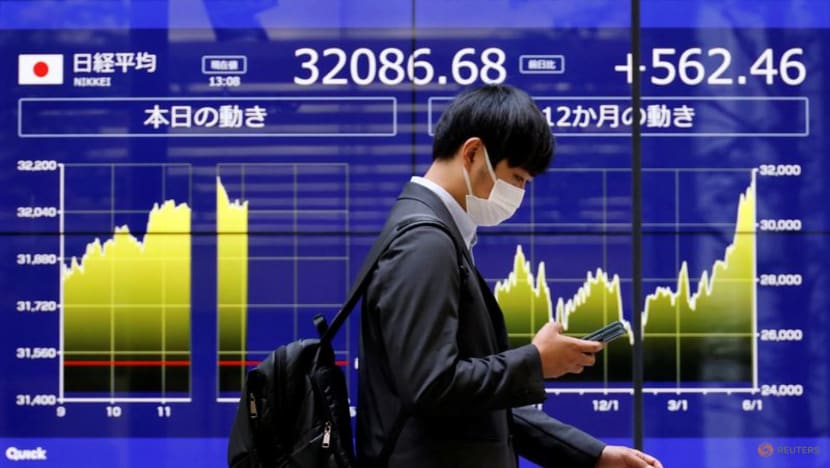Commentary: Tokyo could win 'not China' global hub status - but it must want it
Optimists see the chance of benefits as Sino-US tensions alter the financial dynamics, says the Financial Times’ Leo Lewis.

TOKYO: The head of a US venture fund calls to say he will be in Japan next month for the first time in years. He needs to get a grip on the place, and fast.
As an American investor, he cannot look at China right now and may never again. Tokyo, he reckons, is on course to become the “second city of the Western world”.
Both he and others who have made similar predictions in recent weeks have alighted on a seductive idea.
It becomes more so with each fresh embitterment of US-China semiconductor diplomacy, and with decisions - such as that of US VC fund Sequoia Capital to split off its China business - that seem to signal a clear break with the world we thought we knew. Tokyo, meanwhile, looks unconvinced.
SIGHTS ON TOKYO AFTER US-CHINA DECOUPLING
Still, the argument nags. The geopolitical and financial hefts that were once respectively concentrated in London and West Berlin in the previous century’s cold war will in the “second city” thesis naturally combine in explicitly US-friendly Tokyo as we hunker down for a new one.
Tokyo’s quest to become a global financial hub, meanwhile, will succeed by default as Japan’s “not China” credentials offer solidity in all this flux.
It does not matter, in this theory, whether you call what is happening “decoupling”, or sand its edges and call it “de-risking”. Business is reshaping, finance will follow and in historic realignment, runs the logic of avarice, there is always historic opportunity.
This type of conversation plays as sweet music to the promoters of Tokyo’s ambitions as a global financial centre: A strangely skeletal and necessarily patient lobby whose zeal has traditionally risen in inverse proportion to any serious signals of success.
Critically, this lobby has never been anywhere near the core of what Japan wants or how it sees itself. Plenty of asset owners and managers come to Tokyo; but when the assets tend not to come with them, Japan as a whole just shrugs.
THE TIME IS NOW
For the Tokyo boosters, now may be the yearned-for breakthrough: Their cause might be winnable through an unexpected twist or two of geopolitics.
There are three genuine grounds for optimism. The first works around the idea that the global realignment of the chip industry, in parallel with the broader “de-risking” strategies of both Japanese and foreign companies, could draw businesses and even regional hubs away from China (and Hong Kong) and towards Tokyo.
The revelation in May that South Korea’s Samsung was looking to establish a US$200 million research and development centre in Japan provided striking optics for the sense that old rules are crumbling quickly.
The second is that US-China tensions are already altering the dynamics of merger and acquisition markets. Japan’s more proactive companies are looking for growth outside the shrinking domestic market, and will acquire to secure it.
They have roared back from the pandemic, say mergers and acquisitions (M&A) advisers, as among the most active in the world, and find themselves in markets - especially the US - where they are emboldened by the absence of competition from Chinese buyers.
At the same time, geopolitics are helping to drive more M&A activity in Japan itself. Companies are under intensified shareholder pressure to sell non-core assets, and in many cases are able to do so because of the many private equity firms for whom Japan is a plum market with a now rare availability of cheap financing.
These firms are armed with deep reserves of financial dry powder - funds raised broadly for acquisitions in Asia that are now unlikely to be deployed in China.
The third is Sequoia’s decision to split itself up, and the symbolic unbundling of one of the most successful US-China investment alliances. Certainly, there are company-specific reasons why such a move was possible - even desirable.
But the conclusion that Tokyo has already drawn is that Sequoia will be merely one of many to take similar routes.
Financial firms and investors may be first. Multinational companies spinning off China operations will be next: Some of those, at least, may decide on Tokyo as their non-China Asia hub.
The problem is that these forces remain at best theoretical guarantees of enhanced financial hub status for Tokyo. At the margins, the city may spend the next few years gently expanding its financial services in line with demand, and even becoming something of a powerhouse for US-Japan deal advisory work.
But to become the great Asian financial centre of a new cold war, Tokyo must actually seek that status. Despite everything going on, it is not going to happen by accident.














